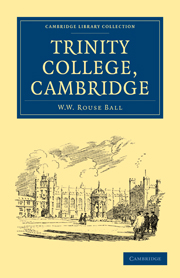Book contents
- Frontmatter
- PREFACE
- Contents
- LIST OF ILLUSTRATIONS
- CHAPTER I THE COURTS AND BUILDINGS
- CHAPTER II SOME INTERIORS
- CHAPTER III KING'S HALL AND MICHAEL-HOUSE, 1316–1546
- CHAPTER IV FOUNDATION AND GROWTH OF TRINITY COLLEGE, I546–1615
- CHAPTER V THE COLLEGE FROM 1615 TO 1820
- CHAPTER VI THE NINETEENTH CENTURY RENAISSANCE
- INDEX
CHAPTER III - KING'S HALL AND MICHAEL-HOUSE, 1316–1546
Published online by Cambridge University Press: 05 August 2011
- Frontmatter
- PREFACE
- Contents
- LIST OF ILLUSTRATIONS
- CHAPTER I THE COURTS AND BUILDINGS
- CHAPTER II SOME INTERIORS
- CHAPTER III KING'S HALL AND MICHAEL-HOUSE, 1316–1546
- CHAPTER IV FOUNDATION AND GROWTH OF TRINITY COLLEGE, I546–1615
- CHAPTER V THE COLLEGE FROM 1615 TO 1820
- CHAPTER VI THE NINETEENTH CENTURY RENAISSANCE
- INDEX
Summary
THUS far I have been concerned chiefly with the buildings of the College. We must now turn to the history of the Society that occupies them. The following pages are summarised from a sketch on the subject which I wrote for my pupils in 1899.
I have already stated that the history of Trinity College is closely connected with that of King's Hall and Michael-House. It will be convenient to preface what I have to say about those ancient foundations by a few words on the medieval University of which they formed a part.
The University of Cambridge originated about the end of the twelfth century. At first the students lived in lodgings, but, by the close of the medieval period, we find all, or nearly all, of them living in Monastic Hostels, Colleges, or Private Hostels. Of these the Colleges alone survived the Renaissance. The Monastic Hostels were maintained by religious orders for the reception of those of their members who were studying at the University. These ceased to exist with the suppression of the mother houses at the Reformation. Private Hostels were for the reception of Pensioners, i.e. of students who paid their own expenses, which for an average student came then to from £9 to £14 a year. A private hostel was managed by a master of arts who lived in it; it resembled in some respects a boarding-house at a modern public school, and maintained a continuous life.
- Type
- Chapter
- Information
- Trinity College, Cambridge , pp. 36 - 48Publisher: Cambridge University PressPrint publication year: 2010First published in: 1906



